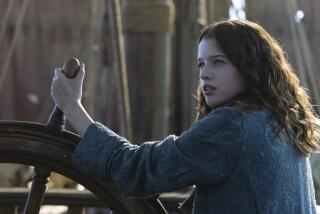Peter Pan, Pinocchio or Pedophile?
- Share via
“So much of this case involves what the nature of Neverland is,” defense attorney Thomas A. Mesereau Jr. told Judge Rodney S. Melville on March 18. Is Michael Jackson’s Neverland Valley ranch an Edenic sanctuary for sick and underprivileged children, or a pedophile’s lair, a “criminal location from A to Z”?
In the defense’s permissive scenario, Neverland is an enchanted playground full of zoo animals, toys and Disney characters, where children can eat pizza or candy all the livelong day and snuggle up to a charitable and childlike Jackson in his toy-soldier uniforms or jammies all night.
Housekeeper Kiki Fournier (only in Southern California are housekeepers named Kiki) testified that often the estate was like “Pinocchio’s Pleasure Island,” an unsupervised wild zone, where boys could “watch videos, play videogames, eat whatever you want to eat, stay up as late as you want, ride amusement park rides.”
In the prosecution’s paranoid scenario, Neverland is as sinister as the headquarters of a Bond-movie villain, and Jackson is as cunning an evil genius as Goldfinger. The fact that Neverland is a fortress with an elaborate security system, hidden surveillance devices and an army of impassive bodyguards and accomplices bolsters this version. Jackson keeps a stash of girlie mags and heterosexually explicit material allegedly to lead young boys astray.
In a scheme so bizarre that 007 would not scorn to confront it, prosecutors contend that Jackson made provocative statements about sharing his bed with boys in a TV documentary; then held his whole family captive to force them to deny any acts of molestation; and, once the media and the law enforcement communities were suspicious and snooping around, boldly proceeded to molest the Accuser.
Jackson’s choice of a name from “Peter Pan” for his estate signals his own understanding of its nature. Both “Peter Pan” and “Pinocchio” are about imaginary worlds for boys. But “Pinocchio” is a much more moralistic story. The Pleasure Island of Disney’s 1940 cartoon version is a place where little boys go on perpetual holiday from school, cavorting, smoking and gambling; then they grow long ears, turn into stupid little donkeys and are sold or even butchered.
The message is clear: Without education and self-discipline, little boys will become dumb beasts of burden. Pinocchio’s goal is to become a “real boy,” one who cares for his aged father, tells no lies and accepts adult responsibilities. Pleasure Island is a way station on Pinocchio’s journey, a means to his moral end.
But for Peter Pan, Neverland is the end. The story preaches no moral lessons at all. Peter Pan is as amoral as he is asexual; he will never grow up and he does not have adult responsibilities or adult relationships.
Yet the story does have a message: Without intellectual development and emotional commitment, eternal childhood is a kind of living death. Peter Pan is a lonely and tragic figure, and the nature of Neverland is as pathetic as it is alluring.


